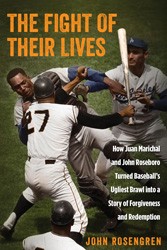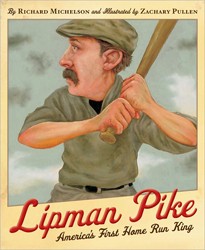Persons of high achievement often engender jealousy, which leads to derisive comments about how lucky they have been. Often, however, their luck is “the residue of design,” in the words of Branch Rickey, who is the subject of Lee Lowenfish’s comprehensive biography of an accomplished, complex, American original. Athlete, coach, general manager, owner, and baseball visionary are some of the ways to describe Rickey, but there are other descriptors as well: patriot, leader, capitalist, moralist, skinflint, political conservative, Christian, pragmatist, and pioneer.
In Branch Rickey, Lee Lowenfish has written a thoroughly researched, engrossing biography of a man whose influence on America surpassed his achievement in sports. Rickey is best remembered for his determined pursuit of justice for black Americans. His courage in breaking baseball’s color line, thus providing African Americans with an opportunity to demonstrate talent and in more mundane terms to find work to support themselves and their families, was exceeded only by the courage of Jack Roosevelt Robinson, who was specially selected by Rickey for his role as racial trailblazer because of his athleticism, intelligence, and self-discipline. This was a fortuitous confluence of imagination and commitment, for both Rickey and Robinson became partners in a peaceful civil revolution whose ramifications neither of them could envision at the time. America is a different nation today, in part because of what Rickey and Robinson started with the simple “boldness,” in Rickey’s words, “about things I say I believe, even to the point of rashness.”
Rickey was made for a Brooklyn of memory and imagination, and Brooklyn in the 1940’s was the ideal setting for Rickey’s genius. Home to the displaced, both those emerging from the camps of Europe and those who migrated north from the blatant prejudice of the south, Brooklyn was receptive to a baseball team featuring “the other,” and hospitable to the strivings of the disenfranchised. And whether based on his fiscal acumen or moral grounding, Rickey produced an achieving organization that appealed to Brooklyn’s spirit of justice and competition.
For baseball fans, ample attention is given to pennant races and the minutiae of building winning organizations in St. Louis and Brooklyn, and then weaker teams in Pittsburgh. Rickey’s fertile mind led to his leadership of the stillborn Continental League that spawned baseball’s expansion to Minnesota and New York, Houston and Florida. He also created the farm system and Spring training models that we now take for granted. But Branch Rickey’s influence, transcending sport, continues to be felt, four decades after his death at age 83.
Lowenfish has illuminated one man’s life. In so doing, he reveals much about 20th century America.




